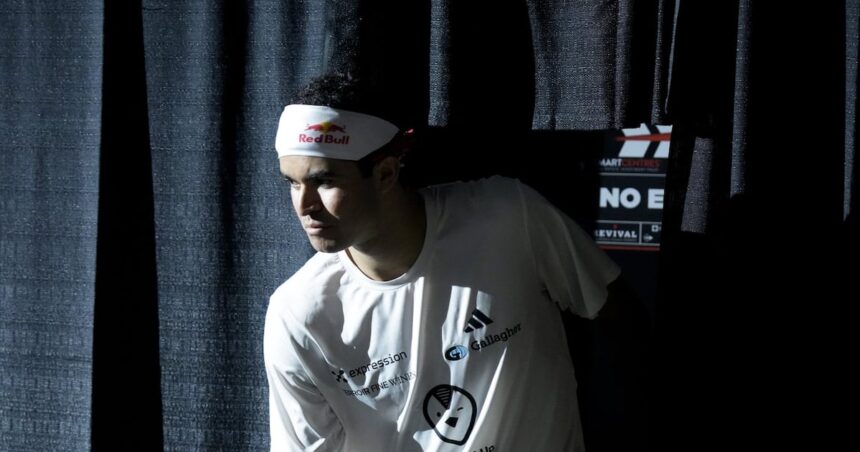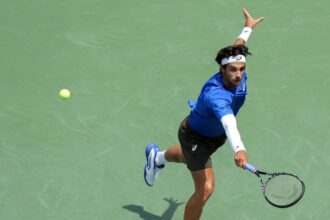The rhythmic thud of rubber against wall echoes through Toronto’s glass-enclosed courts as Peru’s Diego Elias, the world’s second-ranked squash player, prepares for what might be the defining moment of his career. The 2025 PSA World Tour Finals, set to unfold next week in Toronto, represents more than just another tournament for Elias—it’s a homecoming of sorts.
“Toronto feels like my second home now,” Elias tells me during a brief training break at the Toronto Athletic Club, where he’s been fine-tuning his game since arriving early last week. “I’ve been living here half the year since 2022. The energy of this city, the people—it’s become part of my story.”
At 28, Elias stands at the peak of his powers. The “Peruvian Puma,” as fans have dubbed him, has collected an impressive array of PSA titles over the past three seasons, cementing his status as one of the sport’s most formidable talents. His fluid movement and tactical precision have drawn comparisons to squash legends like Jonah Barrington and Jahangir Khan—high praise in a sport that values technical mastery above all else.
Toronto’s relationship with squash has always been passionate if somewhat understated. The city boasts one of North America’s most vibrant squash communities, with dozens of clubs scattered across its neighborhoods. What makes this year’s Tour Finals particularly significant is the growing prominence of squash in Canadian sporting culture—a shift partially credited to Elias’s decision to base himself here during the North American season.
“When I first came to Toronto, I was just looking for a good training base,” Elias explains. “What I found was a community that embraced me completely. The coaching resources here are world-class, and the competition keeps me sharp.”
Elias’s connection to Toronto runs deeper than convenience. His coach, former world number three Jonathon Power—the first North American to reach world number one in squash—has been instrumental in his development. Their partnership, which began when Elias was just 16, has blossomed into one of sport’s most productive mentor-protégé relationships.
“Jonathon doesn’t just teach squash,” Elias says, his admiration evident. “He teaches you how to think on court, how to manage pressure, how to see opportunities others miss. Having him in my corner has transformed my approach to the game.”
The evolution of Elias’s playing style over the past three years reflects Power’s influence. Once known primarily for his attacking flair, Elias has developed a more complete game—patient when necessary, explosive when opportunity presents itself. This tactical flexibility has proven especially effective against top-ranked Ali Farag, whom Elias has beaten three times in their last five encounters.
For Toronto’s squash enthusiasts, hosting the Tour Finals represents a rare opportunity to witness the sport’s elite performers on home soil. Tickets sold out within hours of release—a testament to both the growing popularity of squash and Elias’s drawing power in his adopted city.
“The atmosphere at Canadian tournaments is always special,” Elias notes. “But this feels different. There’s this sense of anticipation I haven’t experienced before. People stop me on the street to wish me luck—sometimes I forget I’m not actually in Lima!”
The tournament’s significance extends beyond Elias’s personal journey. At a time when squash continues its push for Olympic inclusion—narrowly missing out on the 2028 Los Angeles program—events like the Tour Finals serve as crucial showcases for a sport often overlooked by mainstream media.
“We’re playing some of the most physically demanding matches in any sport,” Elias asserts with quiet conviction. “The level of fitness, strategy, and mental toughness required is extraordinary. More people are starting to recognize that, and tournaments like this help bring new eyes to squash.”
As our conversation winds down, Elias returns to the practice court, where Power awaits. The intensity of their session speaks to the stakes of next week’s competition. For Elias, victory in Toronto would represent more than just another trophy—it would be a validation of the choices that brought him here, a tribute to the city that has become his second home.
“Winning here would mean everything,” he acknowledges, a rare moment of sentimentality breaking through his competitive focus. “Not just for my career, but for everyone who’s supported me in Toronto. This city has given me so much—I’d love nothing more than to give something back.”
As the Tour Finals approach, Toronto prepares to embrace its adopted champion. Whether Elias claims the title or not, his journey from Peruvian prodigy to Toronto tennis icon represents something profound about sport’s capacity to transcend borders and forge unexpected connections. In a world increasingly defined by division, there’s something refreshingly hopeful about a Peruvian athlete finding his competitive home in a Canadian metropolis—and in the process, elevating both his game and his adopted city.






















